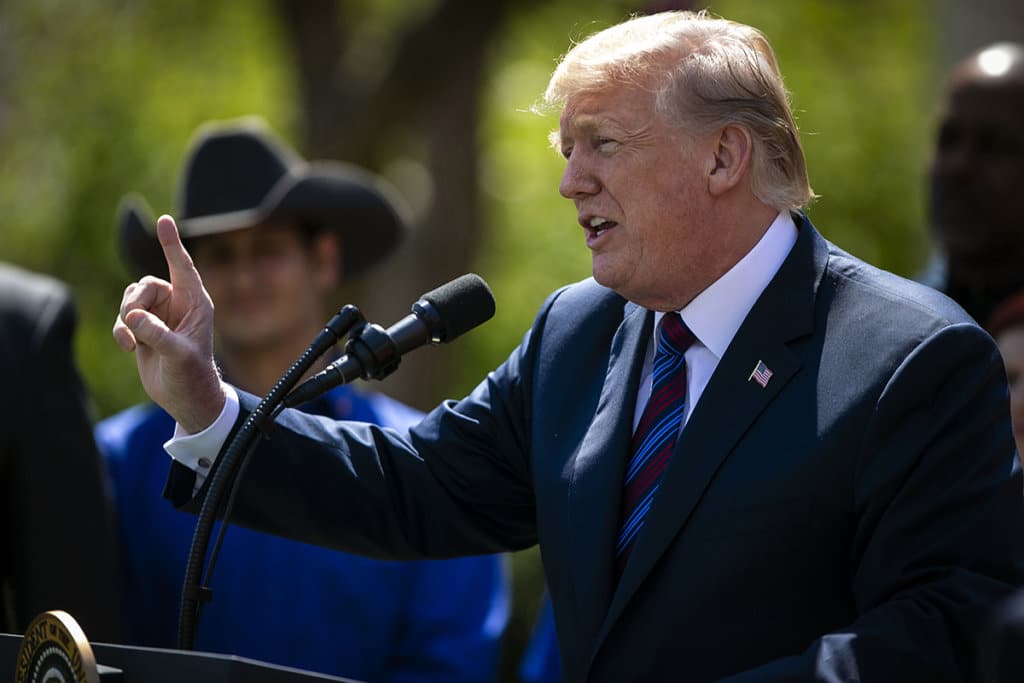President Donald Trump, more than any modern president, freely expresses his racist views – whether it is calling Mexican immigrants rapists, asserting that immigrants “infest” America, saying neo-Nazis include some “very fine people,” preferring Norwegian immigrants to those from “shithole” countries or associating immigrants with crime in public and in private.
(In May The Post reported on an episode in April 2017: “Trump reminded them the crowds loved his rhetoric on immigrants along the campaign trail. Acting as if he were at a rally, he recited a few made-up Hispanic names and described potential crimes they could have committed, such as rape or murder. Then, he said, the crowds would roar when the criminals were thrown out of the country – as they did when he highlighted crimes by illegal immigrants at his rallies. . . .”) Add in his ongoing feud with African American football players who kneel for the national anthem to protest police brutality (“Get that son of a bitch off the field right now”) and his attack on African American Rep. Maxine Waters’s, D-Calif., intelligence, and you see a president who is either catering to racists or himself harbors racist views.
Voters have noticed. The Quinnipiac poll released this week shows a plurality (49 percent) think he is a racist while 47 percent do not. Among the 47 percent are 86 percent of Republicans, roughly the same percentage that support him. (They simply will not believe the president they voted for is a racist.) More young voters (18-34 years) think he is a racist (56 percent) than do older voters. Perhaps there is something to the polling on millennials that says they are more tolerant and inclusive than older Americans (and themselves are more diverse). Nevertheless, by a small margin (50 percent to 44 percent) voters are willing to believe Trump’s sincere beliefs about controlling the border, not racism, are the main motivator for his immigration policies.
Even more interesting, a large majority (55 percent to 39 percent) think Trump has emboldened other people to voice racist views. Even 22 percent of Republicans acknowledge that. Women, those with college degrees, younger voters and African Americans say Trump has emboldened racists to speak out in greater numbers than voters without college degrees, older voters and whites. In short, even if Americans do not admit Trump is a racist, they are willing to concede he’s popularized racist language. When it comes to handling race relations or uniting the country, a substantial majority (58 percent disapprove, 36 percent approve for both) disapprove of his performance.
Voters are also far less cavalier about the fate of Hispanic children than Trump is. “Separating children from their parents was a violation of human rights, American voters say 60-36 percent,” the pollsters report. “The Trump Administration has a responsibility to unite these children with their parents, voters say 83-12 percent. Undocumented immigrants are not more likely than American citizens to commit crimes, American voters say 69-25 percent.”
There are a few takeaways from this data.
First, in case you thought Trump was “getting away” with his racism, he’s not. In the most blunt phrasing possible virtually half of Americans call him a “racist,” close to the worst thing you can call someone in public life. Even more apparent to voters is his influence on encouraging racism among others and dividing the country. If Democrats want to get traction among voters not already in their corner they’d be much smarter to attack Trump for what he is doing to the country (e.g. dividing, emboldening racists) than calling Trump and his supporters racists.
Second, Americans are as united as they ever are on the obligation to reunite families. Any Democrat or anti-Trump Republican should regularly raise Trump’s failure to do so. Trump’s Republican Party has not only forfeited any claim to be the party of “family values,” but has also disgraced America in the eyes of the world. This is not what most Americans expect or want of their country. (Remarkably, 60 percent are willing to call Trump’s child separation policy a human rights violation.) Critics of Trump’s inhumane policy of child separation should not be assuaged with the shift to indefinite incarceration for whole families. Jailing children under any circumstances in this context is unacceptable; forcing parents to make a choice between giving up their kids or giving up their legitimate asylum claims is grotesque.
Third, Americans are more resistant to racism than one might imagine. They don’t think immigrants commit more crimes, don’t like his immigration policies (58 percent to 39 percent) and by a large plurality want to make it easier to immigrate to America (49 percent to 32 percent). After two years of hearing Trump smear and dehumanize immigrants, they aren’t buying his line. Those who favor robust legal immigration and a humane, sensible policy toward illegal immigrants (including “dreamers”) don’t need to be defensive. They should make the case – with plenty of facts on their side – that immigrants have always made America great. It’s Trump who is making us small.
(c) 2018, The Washington Post
